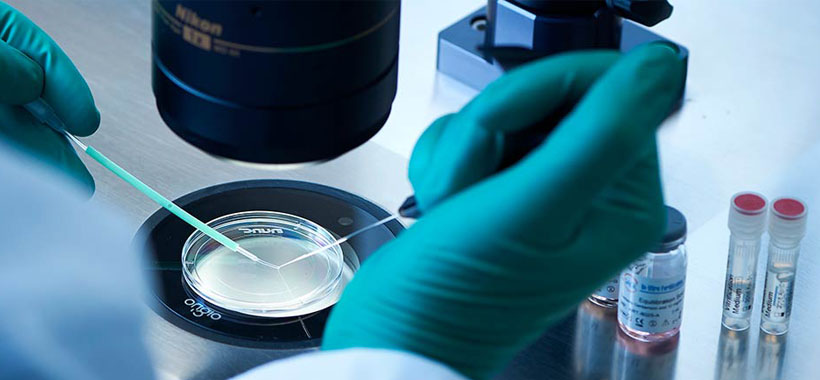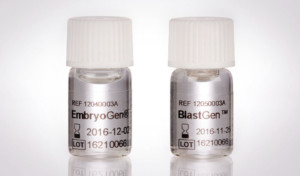
Passed into British law in 1990, embryo development research taking place 14 days after conception is a criminal offence. However, some scientists now believe it should be extended to 28 days, and if they can make a strong enough case, UK Parliament could consider changing the law.
Sandy Starr, Communications Officer of the Progress Educational Trust (PET), gave evidence at the House of Commons My Science Inquiry. The case for a public consultation exercise was made for further embryo development research.
Following a parliamentary inquiry, the consultation would gauge the thoughts of scientists, bioethicists, fertility specialists, religious leaders and the wider public on extending the current 14-day rule, which was recommended in 1984 by the Mary Warnock report.
“The fourteenth day is considered significant as it is when the primitive streak appears,” says Dr David Morroll, Director of Embryology at ORIGIO.
The primitive streak is a transient structure whose formation, on day 15 of human development, marks the start of gastrulation. This is the process in which the inner cell mass is converted into an embryonic disc which comprises the three germ layers ectoderm, mesoderm, and endoderm.
“There are two key factors associated with this: firstly, it is impossible – after this point, for an embryo to form twins and so individuality is certain; and secondly, the primitive streak marks the earliest stage in the formation of the central nervous system and so, before this, there can be no risk of suffering.”
“Rather than taking the appearance of a developmental marker, the imposition of a time limit for observing embryos is more easily policed and enforceable.”
“Extending beyond 14 days could provide a lot of new information to help us understand why some embryos lead to a baby and some don’t,” says Dr Cristina Hickman, Head of Embryology at Boston Place Clinic, London. “There’s a lot of good that could come from this research that would help many infertile patients.”
When stating evidence, Sandy Starr urged committee witnesses to consider that, beyond the 14 days allowed for research, “there is a period in which crucial but poorly understood events in the development of the embryo can go awry, leading to loss or disorders of pregnancy, or causing or contributing to congenital disease in a resulting child, or perhaps even diseases that arise later in life.
“By looking into this black box, they
Initial discussions
The release of a publication in May 2016, which included research carried out at the UK’s University of Cambridge and the US Rockefeller University, sparked initial discussions as it reported on the development of human embryos in vitro for 13 days.
The team at Cambridge was led by Magdalena Zernicka-Goetz, Professor of Mammalian Development and Stem Cell Biology and Wellcome Trust Senior Research Fellow, who believes extending the limit could help discover why many pregnancies are lost in the early stages.
Though it is not yet known for how much longer it would be possible to culture embryos, since they have to be destroyed, the specter of breaking the 14-day limit is now looming. Inevitably, this has set in motion a great deal of ethical and moral debate about passing this limit and the possible benefits and risks of allowing such work to be performed.
PET’s 2016 Annual Conference in December 2016 focused entirely on re-thinking the ethics of embryo research.
Discussions included talks from high profile industry experts. These included Dr Kathy Niakan, the first researcher licensed by the UK regulator HFEA (Human Fertilisation and Embryology Authority) to use genome editing in human embryo research. Lord George Carey, House of Lords Crossbench Peer and former Archbishop of Canterbury was also in attendance. Baroness Warnock who would not support an extension of her recommendation in the 1984 report also spoke about her thoughts.
Those that wish to keep the 14-day limit argue there is still a great deal of work to do up until 14 days and there is not yet an imperative to push beyond this.
There is also the issue of weighing up the possible benefits of research beyond 14 days against the risks of creating an opening for a revision of embryo research regulations to set more restrictive rules, though a YouGov UK opinion poll found 48% approved of the proposed extension for embryo research to 28 days while only 10% wanted a total ban.
Scientific arguments
There are also some scientific arguments. Scientists and ethicists, gathered at Harvard Law School, discussed whether the stricture should be revised at an event last November. The debate involved current research that uses stem cells to produce self-organizing embryo-like structures (SOELSs) or synthetic human embryo-like entities (SHELEs) to study facets of early development.
With improvements in this technique, there is now the question of whether such entities should be regarded in the future as the equivalent of embryos.
Another argument against exceeding the 14-day rule is the availability and advantages of using non-human primate models, such as the baboon, to undertake investigations.
“Various researchers are using primates to study fertilization, ovarian stimulation, embryo development, embryonic stem cell derivation for regenerative medicine, cloning, and genetic disorders,” says Dr Steven Fleming, Director of Embryology at ORIGIO.
“There is still much we can learn from these studies without needing to re-address the 14-day rule. For example, cytokines such as GM-CSF have been identified within the female reproductive tract of sheep, cattle, and pigs and have been shown to be obligatory for implantation using the mouse model.
 “The insight gained from these animal studies has been translated into IVF clinical practice through the addition of GM-CSF to culture media, which has been demonstrated to significantly reduce rates of repeated implantation failure and recurrent miscarriage.”
“The insight gained from these animal studies has been translated into IVF clinical practice through the addition of GM-CSF to culture media, which has been demonstrated to significantly reduce rates of repeated implantation failure and recurrent miscarriage.”
Professor Simon Fishel, who was involved in the birth of Louise Brown, the UK’s first IVF baby and founder of the CARE Fertility Group told the BBC, “There are some religious groups that will be fundamentally against IVF, let alone IVF research in any circumstances, and we have to respect their views.”
Inevitably the debate will run and run and the arguments on both sides have merit and warrant thorough and detailed consideration.
“As a biologist, it is exciting to think we will soon be able to study our very early development but, as a clinical scientist, I also know we must ensure that our field does not run too far ahead of public opinion,” says Dr Morroll.
Dr Hickman concluded, “Clinical practice won’t change. I don’t see us altering embryos on day 15 to transfer them back – even in the long term.”
An inquiry date is yet to be announced.

 My Clinic is in the United States
My Clinic is in the United States My Clinic is in Canada
My Clinic is in Canada